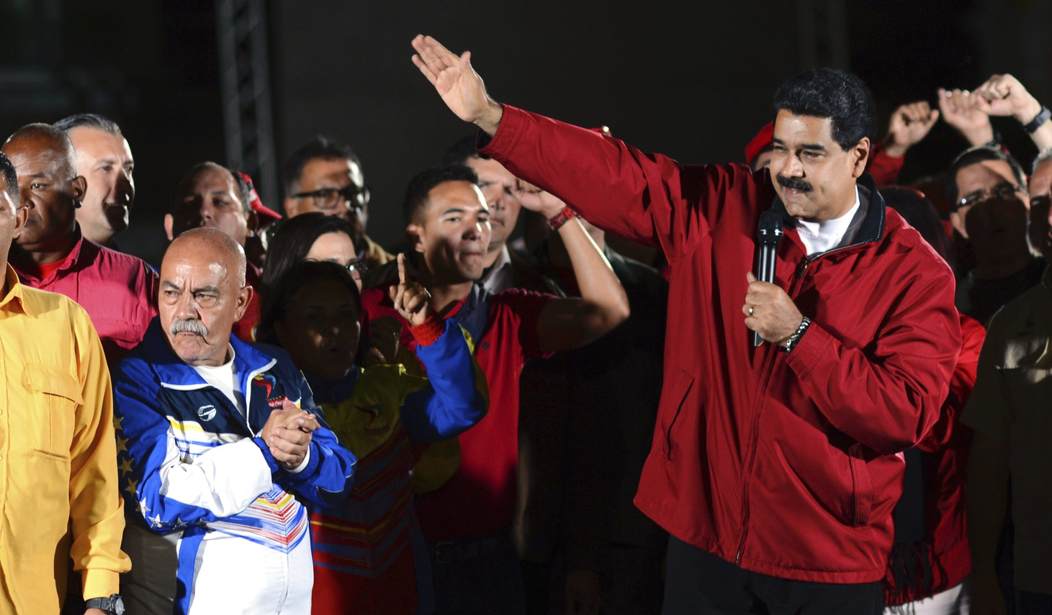WASHINGTON — The Treasury Department imposed sanctions on Venezuelan President Nicolas Maduro for what the leader of that country’s National Assembly called “the biggest electoral fraud in our history,” while the White House was mum on Russian President Vladimir Putin’s retaliation for a sanctions bill that President Trump has yet to sign.
White House press secretary Sarah Huckabee Sanders said in a brief statement Friday night that Trump has “now reviewed the final version” of the sanctions bill covering Russia, Iran and North Korea that passed both chambers by veto-proof majorities, “approves the bill and intends to sign it.” The White House previously has expressed objections to language in the bill that requires congressional approval of any administration sanctions rollback, arguing it ties their hands in foreign policy maneuvers.
If both chambers of Congress were in recess, the president would be able to exercise a “pocket veto” — the bill would automatically become law if he doesn’t sign within 10 days, unless Congress adjourns. The House has left town, but the Senate is in session for two more weeks — and lawmakers have already said the Senate will stay in pro forma session throughout the break to keep Trump from making recess appointments.
“We’ll let you know when that’s going to happen,” Sanders told reporters Monday, not offering any more details on the signing of the sanctions bill.
Putin has ordered 755 American diplomatic personnel be cut and two diplomatic facilities in Moscow be shut down. “As you might have noticed, we waited quite some time in the hope things would change for the better,” Putin told state television in an interview Sunday. “We hoped that the situation would change, but judging by everything, if it is going to change, then it won’t be soon… we have to show that we will not let this go unanswered.”
At the White House, when asked about Putin’s retaliation and why Trump has been silent, Sanders replied, “Right now we’re reviewing our options and when we have something to say on it, we’ll let you know.”
Senate Minority Leader Chuck Schumer (D-N.Y.) stressed on the Senate floor Monday that the sanctions bill “gives Congress the ability to review any decision to weaken, dilute, or lift sanctions on Russia — President Putin will not be able to get out from under the sting of these sanctions without the consent of Congress.”
“Let this be an unequivocal message to Mr. Putin and any other nation that’s thinking of interfering in our elections: if you interfere with our elections, which we hold sacred, you will be sanctioned, and those sanctions will be severe,” Schumer warned.
Senate Armed Services Committee Raking Member Jack Reed (D-R.I.) predicted that the expulsion of U.S. diplomatic personnel will “in the long run… be a penalty to the Russians” as embassy lines for visas get longer.
“The one thing we have to do is not allow Putin to see this as a moral equivalence,” Reed told CNN, reiterating why Russia was sanctioned. “…And I think the president should be speaking out very strongly about how this underscores not what we have done inappropriately, but what the Russians consistently do inappropriately.”
Under the new Venezuela sanctions, Maduro’s assets are frozen and Americans are banned from dealing with him.
“By sanctioning Maduro, the United States makes clear our opposition to the policies of his regime and the support for the people of Venezuela, who strive to return their country to a full and prosperous democracy,” Treasury Secretary Steve Mnuchin said at the daily briefing Monday. “As the country’s head of state, Maduro is directly responsible for Venezuela’s descent and for the destruction of democracy.”
Maduro claimed nearly 42 percent of registered voters cast ballots Sunday to create a legislature composed of his backers, while Miranda state Gov. Henrique Capriles, a Maduro opponent, pegged the nationwide turnout closer to 15 percent. Meanwhile, Maduro dismissed an unofficial vote on July 16 in which more than 7 million voted in a referendum against his new assembly.
“What we’re seeing in Venezuela is — is not a coup,” National Security Advisor H.R. McMaster, appearing alongside Mnuchin at the White House briefing, said. “What we’re seeing is the brutal oppression of the Venezuelan people. And so it’s clear, if you contrast the turnout from the opposition referendum to the very low numbers of the turnout during this farce associated with the Constituent Assembly, I think you see what the true desires of the Venezuelan people are.”
The cabinet officials were asked why the administration sanctions Maduro for a questionable referendum yet Trump congratulated Turkish President Recep Tayyip Erodgan on an April referendum that also expanded his powers.
“Well, I mean one difference is, is you see the end of the constitution in Venezuela. And this is — this is happening obviously at an accelerated pace in recent months over — in the Maduro regime, but this is a process that has taken really two regimes to really restrict Venezuelan democracy,” McMaster replied.
“And by designating — by designating Maduro himself, he joins a very exclusive club, including Mr. Mugabe, Bashar al-Assad and Kim Jong-un, in terms of the brutal repression of his people and, in this case, the abrogation of the constitution with the constituent assembly,” he added.
The reporter then asked, “Erdogan hasn’t repressed anyone?” Neither responded and Mnuchin moved on to the next question.
In a response Monday night, Maduro said Trump is “making the biggest mistake of his life in messing” with him.
“You are either with Trump or you are with Venezuela. You are either with Trump or with democracy,” Maduro said.
Sen. Marco Rubio (R-Fla.) said that “the sanctions imposed today on Nicolas Maduro are warranted.”
“However, I remain confident the president will keep his clear commitment to impose economic sanctions on the regime if they convene the illegitimate Constituent Assembly,” Rubio added in English and Spanish statements.








Join the conversation as a VIP Member